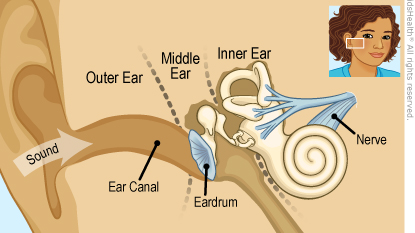Sensorineural hearing loss (SNHL) happens when there is a problem with the inner ear or the nerve from the inner ear to the brain. A child with SNHL may find it hard to understand what someone says. Soft sounds can be hard to hear. Although SNHL does not go away, hearing aids and other treatments can help some kids hear better.

To help your child at home:
- If your child needs to wear a hearing aid or use another assistive listening device, teach them how to use and care for it.
- Talk to your child often. To help your child understand you:
- Get your child's attention before you start to talk.
- Be sure your child's better ear is facing you.
- Use facial expressions like smiling and gestures like pointing to help your child understand what you're saying.
- Do not have the TV, music, or loud appliances on when you talk to your child.
- If needed, use sign language to communicate with your child.
- Teach your child to ask, "Will you please repeat that?" if they did not hear something.
- Teach your child to use their ears AND eyes to check for cars and other dangers when riding a bike or crossing a street.
- To protect hearing, teach your child to:
- Avoid or move away from loud noises (such as from lawn mowers, power tools, and blenders).
- Wear protective earplugs or earmuffs if a loud noise can't be avoided (cotton in the ears does not protect hearing).
- Turn down the volume when listening to music.
- Take breaks about every hour when wearing earbuds or earphones.
- Go to all visits for follow-up and testing as recommended by your health care team.
To help your child at school:
- If possible, choose a child care or a school that has smaller rooms instead of one big room. Smaller rooms tend to be less noisy.
- Have your child sit close to the teacher with the better ear facing the teacher.
- Ask the teachers to repeat information and check for understanding. Written directions and handouts can help older children understand what is said in the classroom.
- If your child needs more help, meet with the teacher and ask for a special plan, which may include a 504 plan or an individualized education program (IEP).

What causes SNHL? SNHL often runs in families. Other causes include:
- infections while in the womb
- complications of prematurity (being born early)
- some medicines
- problems with how the inner ear formed
- being around loud noises
What is the treatment for SNHL? Treatment depends on how severe the hearing loss is. A hearing aid and/or assistive listening device can help some kids. Cochlear implants can help some children with severe hearing loss when a hearing aid can't. A cochlear implant is put in the inner ear by a surgeon. The device bypasses the inner ear and sends electrical signals directly to the hearing nerve.
Can SNHL lead to other problems? A child with SNHL may have speech and learning problems. It also can be hard to talk to and be with friends. If needed, kids with SNHL can learn other ways to communicate, like sign language. If your child is learning sign language, it's helpful for everyone in the family to learn to sign too.
Who will be on my child's health care team? Children with permanent hearing loss should be seen by a team of specialists, including:
- an ENT (ear, nose, and throat) doctor
- an audiologist (a specialist in hearing testing)
- a speech therapist
- other specialists, as needed



